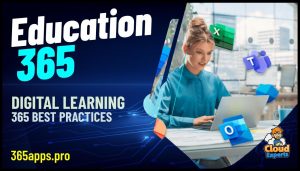AI in Education 365 – The Latest Updates from Microsoft EDU
AI brings numerous benefits to education, enabling personalized learning experiences and providing tailored recommendations, and automating administrative tasks, freeing up educators' time to focus on teaching.
 Microsoft is constantly striving to enhance their products and services by leveraging the power of artificial intelligence (AI).
Microsoft is constantly striving to enhance their products and services by leveraging the power of artificial intelligence (AI).
In the realm of education, Microsoft has integrated AI into their 365 suite, providing educators and students with innovative tools and features that enhance learning experiences.
In this tutorial Mike Tholfsen shares a deep dive into AI for Education, including Copilot and new features in Microsoft Education, covering the range of capabilities and upcoming AI updates across Microsoft, including Copilot, Copilot for M365 for Educators, New features in Microsoft Teams for educators, Learning Accelerators, the AI-powered Reading Coach, and Microsoft Designer.
Also covered are Responsible, AI, new AI courses for educators to learn more, and the option to sign up for new private previews. Get fully up-to-date on AI capabilities that educators can use today, as well as new updates coming soon.
Microsoft recognizes the potential of AI in transforming education. By incorporating AI into their 365 suite, Microsoft aims to empower educators and students with intelligent tools that enhance productivity, collaboration, and personalized learning experiences.
Microsoft Copilot is changing the landscape of generative #AI in education.
This innovative tool helps save time creating lesson plans, brainstorming activities, personalizing learning, and more.
Read the blog for steps to get started: https://t.co/3RyMwRDOe7
#MicrosoftEDU pic.twitter.com/98Ui1X48Nw— Microsoft Education (@MicrosoftEDU) January 23, 2024
Benefits of AI in Education
AI brings numerous benefits to the field of education. It enables personalized learning experiences by analyzing individual student data and providing tailored recommendations. AI-powered tools also automate administrative tasks, freeing up educators’ time to focus on teaching.
Additionally, AI can improve accessibility by providing real-time language translation and captioning services. These benefits contribute to a more inclusive and efficient educational environment.
AI has a wide range of applications in education. Here are some notable examples:
- Personalized Learning: AI can analyze student data to identify individual learning patterns and preferences. This information can then be used to deliver personalized learning materials, adaptive assessments, and targeted interventions, ensuring each student’s unique needs are met.
- Intelligent Tutoring Systems: Intelligent tutoring systems leverage AI to provide personalized guidance and feedback to students. These systems can adapt to individual learning styles and pace, offering tailored support and recommendations to enhance learning outcomes.
- Automated Grading: AI-powered grading systems can automate the grading process for assignments and assessments. By utilizing machine learning algorithms, these systems can provide fast and accurate feedback, saving educators valuable time.
The Future of AI in Education
The integration of AI into Microsoft’s 365 suite for Education is just the beginning. The future holds immense potential for AI to revolutionize education further. Advancements in natural language processing, computer vision, and personalized learning algorithms will continue to shape the educational landscape, fostering innovation and improving learning outcomes.



